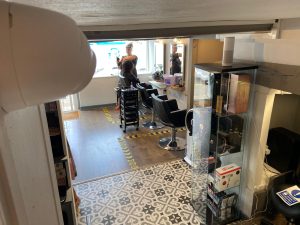Is CCTV in the Workplace Legal?
If you’re a business owner considering installing commercial CCTV systems to improve security, you might be wondering: Is CCTV in the workplace legal? This article aims to clarify the legal requirements associated with CCTV installation in the workplace, particularly focusing on GDPR compliance. We will also explore the benefits of CCTV, such as deterring theft and sexual harassment.
CCTV Requirements in the Workplace
It is legal for a workplace to have CCTV, but only if they follow GDPR rules and other regulations set out by the Human Rights Act 1988. The latter guarantees that individuals have a right to respect for their private life, and the use of CCTV must not infringe upon this.
For these reasons, CCTV in the workplace must only be used for a legitimate purpose. It must not be placed in areas where employees have a reason to expect privacy (such as toilets or changing rooms) and clear and visible signs should be displayed to inform visits and employees that they are being recorded.
Find the perfect CCTV security system for your business.
CCTV and GDPR Compliance
When considering CCTV installation in the workplace, employers must adhere to the General Data Protection Regulation (GDPR). To comply with GDPR, businesses need to follow these key steps:
- Inform employees
Clearly communicate the purpose and location of the CCTV cameras. Employees must be aware that they are being monitored, and the reasons for this monitoring should be clearly stated.
- Perform a Data Protection Impact Assessment (DPIA):
Before installing CCTV, conduct a DPIA to identify and address potential privacy risks.
- Limit data access:
Ensure that only authorised personnel have access to CCTV footage, and maintain a record of who accesses the data.
- Retain footage for a limited period
Store CCTV recordings for a reasonable amount of time, typically no longer than 30 days, unless a specific incident requires longer retention.
- Respond to Subject Access Requests (SARs)
Employees have the right to request CCTV footage featuring themselves. Employers must respond to such requests within one month.
Benefits of CCTV in the Workplace
Commercial CCTV systems, like those provided by COC, offer various benefits for businesses:
- Deter theft
CCTV serves as a powerful deterrent against theft, both from external intruders and dishonest employees.
- Prevent sexual harassment
CCTV can help discourage inappropriate behavior and provide evidence in cases of harassment or misconduct.
- Monitor productivity
CCTV allows employers to monitor employee performance and identify areas for improvement.
- Protect company property
CCTV can help safeguard valuable assets and prevent unauthorised access to restricted areas.
Caught On Camera Case Study: Grade Two Listed Salon, Amersham
Caught On Camera has experience installing CCTV systems in challenging environments, such as the Grade Two listed salon in Amersham. Due to the building’s listing regulations and social distancing measures, Caught On Camera’s team completed the installation outside of business hours. They carefully installed Hikvision cameras while preserving the building’s integrity.
The salon’s clients and staff were delighted with the results of the meticulous installation. Customers even requested Caught On Camera’s business cards for their own CCTV installation needs, highlighting the company’s commitment to quality and professionalism.

CCTV installation in the workplace is legal when employers comply with GDPR requirements and maintain transparent communication with their employees. At Caught On Camera, we provide commercial CCTV systems that can improve workplace security by deterring theft, preventing sexual harassment, and safeguarding company assets.
If your business is located in Cambridge, Essex, Barnet or the surrounding areas, give Caught On Camera a call. We will ensure your business is as safe and secure as possible.

